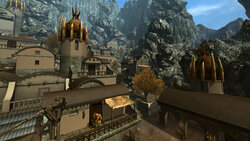Chris Avellone Interview
Chris Avellone Interview
Interview - posted by VentilatorOfDoom on Thu 3 November 2011, 14:11:10
Tags: Chris Avellone; Obsidian EntertainmentGamestar.ru chat up with Obsidian's Chris Avellone.
Please, enumerate five traits of a good RPG.
I could write a treatise on this, but for the short answer: Customization, at least one core advancement system, at least one tactical conflict system (normally, I would say "combat," but if we were doing a stealth-based Thief RPG, "stealth" would be the tactical conflict system), meaningful choices, and significant reactivity. There's many more (for example, I do feel narration and story are important, but not central to the experience).
What do you think about European-styled RPG's like The Witcher, Risen, Gothic, Two Worlds, Fable?
I think they're raising the bar, notably Witcher 2, which was a nice slap to say, "you can do better, you North American developers, and here's proof." Also, Witcher 1 pioneered a lot of great reactivity to your choices. Fable was good in the sense of open-world mechanics, easy multiplayer access, and providing a playground for players. For Two Worlds, there were certain mechanics that we herald as nice systems to incorporate or explore for future games (for example, collecting the same type of magical sword that allowed you to combine them to make them stronger rather than just selling it, a chronic problem most D&D titles have).
Thanks to Jaedar.
Please, enumerate five traits of a good RPG.
I could write a treatise on this, but for the short answer: Customization, at least one core advancement system, at least one tactical conflict system (normally, I would say "combat," but if we were doing a stealth-based Thief RPG, "stealth" would be the tactical conflict system), meaningful choices, and significant reactivity. There's many more (for example, I do feel narration and story are important, but not central to the experience).
What do you think about European-styled RPG's like The Witcher, Risen, Gothic, Two Worlds, Fable?
I think they're raising the bar, notably Witcher 2, which was a nice slap to say, "you can do better, you North American developers, and here's proof." Also, Witcher 1 pioneered a lot of great reactivity to your choices. Fable was good in the sense of open-world mechanics, easy multiplayer access, and providing a playground for players. For Two Worlds, there were certain mechanics that we herald as nice systems to incorporate or explore for future games (for example, collecting the same type of magical sword that allowed you to combine them to make them stronger rather than just selling it, a chronic problem most D&D titles have).














